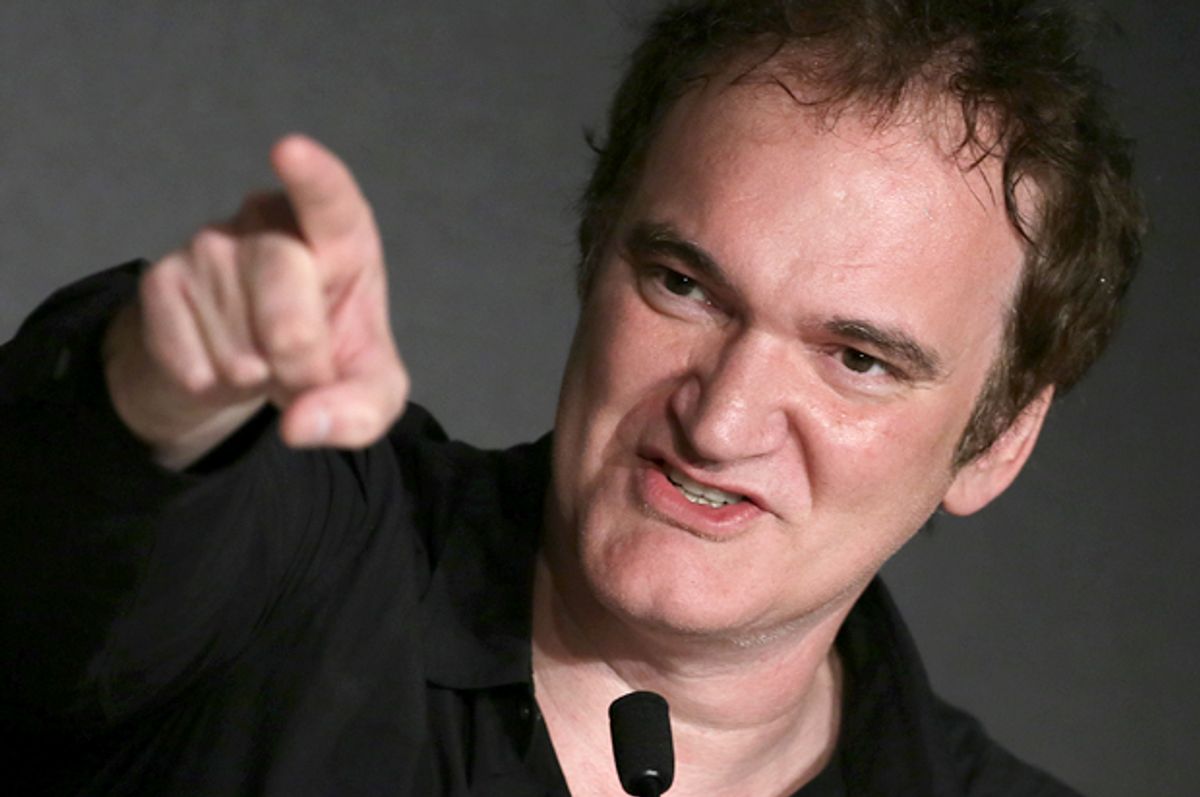Following his brief speech at a demonstration against police brutality last month, director Quentin Tarantino has experienced a backlash from police unions. In particular, Fraternal Order of Police executive director Jim Pasco issued vaguely worded threats about surprising Tarantino and harming him economically. Perhaps he’s bluffing. But threats from police, even nonviolent ones, against a private citizen who has broken no law are totally unacceptable. Pasco highlights just how paranoid and reactionary police culture has become.
Tarantino’s remarks were not even especially controversial. USA Today reported that Pasco’s threats were in retaliation for Tarantino’s “inflammatory remarks against police brutality.” Such a premise is difficult to understand. It’s like accusing someone of making inflammatory remarks against child abuse. What’s inflammatory is police officers going on the attack against anyone who calls out their brutality.
The media spun Tarantino’s remarks as though he claimed all cops were murderers. What Tarantino actually said was, “When I see murder I cannot stand by, and I have to call the murdered the murdered and I have to call the murderers the murderers.” If police are offended by such a statement, and in fact treat it as a declaration of war, then this nation faces a very serious crisis with its law enforcement culture. Even the deeply conservative National Review defended Tarantino.
Touchiness over the slightest criticism stems partly from the blue code, which prevents police from ratting on their brotherhood. It’s rather like the Mafia’s code of silence, omertá – except police are supposed to be public servants, not a secret, criminal society. And this protectionism runs all through the judicial system, from cops to prosecutors to judges. Police are rarely charged for on-duty killings and even more rarely convicted, even when there is damning video evidence as with Eric Garner and Tamir Rice.
Instead of addressing their problems, police and their conservative supporters blame the public. They claim activists protesting police brutality encourage violence against police, which makes their job harder and leads to greater use of force. In actuality, 2015 is shaping up to be one of the safest years for police in decades.
There is no war on cops in any direct, coordinated, physical or violent sense. The war is one of ideas – namely, the public’s idea that police should not use extraordinary force in situations that do not call for it, a new example of which seems to surface daily. Critics like to talk about cops acting above the law in these cases. What’s worse is when they act above public scrutiny.
For instance, much of the public would likely agree that cops shouldn’t beat citizens up over jaywalking. Yet that’s exactly what happened last weekend in Austin, Texas. A suspect who’s been subdued with a Taser and is lying on the ground, groaning in pain and confusion, should not be shot dead in the back. But in Pennsylvania, an extremely hysterical officer who did just that – eliciting a "What the fuck?" from the victim – had all charges against her dropped.
Police like to claim if the public would just follow their prompts without giving them any grief or resistance, interactions between citizens and law enforcement would go a lot smoother. What police fail to understand is the general public is largely unaware of the proper protocol for being yelled at, accosted, clubbed, threatened or jolted with electricity. They shouldn’t be sentenced to death for it. Yet resisting arrest, however loosely defined, is a common defense when police kill unarmed citizens.
Today’s police culture is hypersensitive, both in the way police respond to criticism and how they treat encounters with the public. Responding to justified criticism with threats is beyond the pale for an organization whose mission is to serve and protect. And when any gesture, vocal inflection or indeterminate physical object is perceived as a threat, all the danger of being a cop is effectively passed on to the person being arrested, who must toe a very narrow line or risk becoming another viral video star.
Police seem to have forgotten that they are beholden to the public. Tarantino pays taxes just like anybody else, and it’s the taxpayer from whom police draw their authority. They must address the criticism of the public they’re sworn to serve rather than bully and claim exemption from scrutiny. In the absence of public blessing, their authority is illegitimate. And an illegitimate police state is the most un-American thing imaginable.
This story also appeared on Third Rail News.

Shares